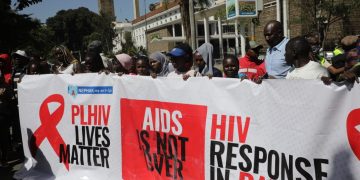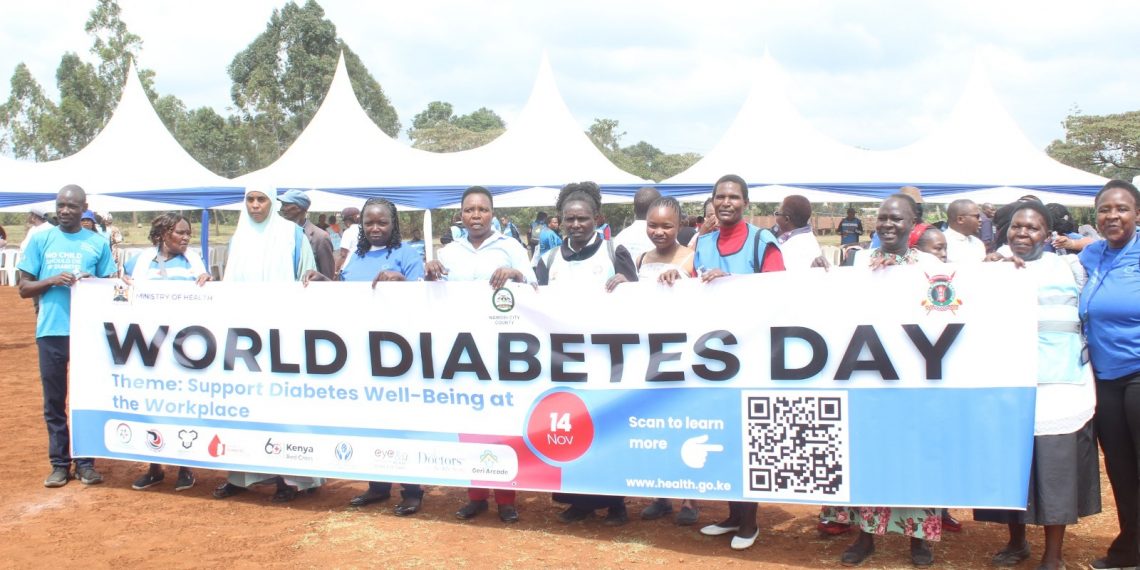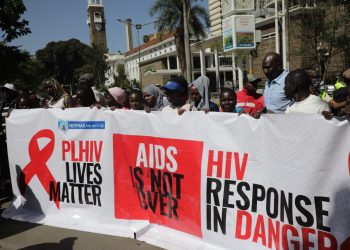As Kenya marked World Diabetes Day on 14th November 2025 at Nairobi West Prison, the government used the occasion to reaffirm its sweeping restructuring of the health sector reforms top officials say are essential to stopping the rapid rise of diabetes and other non-communicable diseases (NCDs).
Presiding over the national commemoration, Dr. Ouma Oluga, Principal Secretary for Medical Services, delivered a firm assurance that the state is committed to ensuring no Kenyan is left behind in accessing healthcare.
His remarks came against a backdrop of alarming statistics and personal testimonies that reflect the growing burden of diabetes across the country.
Dr. Oluga described the country’s ongoing health overhaul as “real reform”, anchored in the Bottom-Up Economic Transformation Agenda (BETA).
He emphasized that the government now sees healthcare not only as a social right but as a critical economic pillar capable of protecting households from poverty and driving national productivity.
“Central to these reforms is the newly established Social Health Authority (SHA)—a structure Dr. Oluga said every Kenyan must understand,” Dr Oluga said.
He added that, “Under the SHA, health financing is built on a three-part structure with funding being government tax-funded contributions and individual and or income-based contributions,” he said.
He outlined the role of the Primary Healthcare Fund, financed through taxes, which supports community health services, dispensaries and health centers.
“These frontline facilities are intended to offer routine screening for diabetes, hypertension and other NCDs,” Dr Oluga said.
“With more than 9,000 such facilities across the country and Sh13 billion already allocated, our goal is to ensure every Kenyan can access early detection and treatment as close to home as possible,” Dr. Oluga noted.
He further stressed the importance of the Emergency, Chronic and Critical Illness Fund, under which diabetes is listed as a chronic condition. Although the chronic care component is still being finalized, he confirmed that the emergency arm is fully operational.
“Emergency treatment whether for strokes, collapses, convulsions or road accidents—is guaranteed within the first 24 hours in all hospitals,” he said, urging facilities to embrace change rather than resist it. “Reform is necessary and long overdue.”
The third pillar of the reform agenda is citizen participation through the Social Health Insurance Fund (SHIF), where Kenyans contribute based on their income.
“These pooled resources ensure that non-emergency but essential procedures such as scheduled surgeries remain accessible,” he said.
Dr. Oluga insisted that healthcare must never be politicized, “When illness strikes, it becomes deeply personal,” he said. “When you or your child or parent needs treatment, it is about you. That is why understanding health financing is critical. We meet you halfway, and you meet us halfway.”
Diabetes a Growing Crisis
While Dr. Oluga laid out the government’s reforms, health advocates painted a stark picture of why these interventions are urgently needed.
Dr. Catherine Karekezi, Executive Director of the Non-Communicable Diseases Alliance of Kenya (NCDAK), described diabetes as “a silent epidemic.”
She noted that in Nairobi alone 36 percent of residents have a family member or friend directly affected by diabetes.
Alarmingly She revealed that nationwide, only 29.4 percent of people living with diabetes know their status, and just 12.5 percent of those with hypertension have it under control.
“Many people go about their daily routines unaware that dangerously high sugar or blood pressure levels are silently damaging their organs,” she said.
Dr. Karekezi warned that unmanaged diabetes can rapidly lead to heart disease, stroke, kidney failure, blindness and even limb amputations.
“The disease, once associated with affluent lifestyles, now cuts across all ages and socioeconomic groups driven by poor diets, high stress, air pollution, tobacco and alcohol use, and declining physical activity.”
“Not all diabetes presents with symptoms,” she cautioned, urging Kenyans to undergo regular screening to avoid late-stage complications.
Dr Karekezi also highlighted the economic toll of diabetes saying that, “Families spend scarce resources on emergency and chronic care, workers lose productivity or become disabled, and children suffer when breadwinners fall ill,” she said. “This is no longer a disease of the affluent. It is a national concern that is breaking households emotionally and financially.”
Under this year’s theme, “Diabetes Wellness in the Workplace,” Dr. Karekezi urged employers to roll out workplace screening programmes and encouraged community and faith leaders to amplify awareness efforts.
She advised individuals to adopt healthier lifestyles reducing salt and sugar intake, walking more, quitting tobacco and managing stress.
“Know your numbers,” she said. “Get tested and encourage your family and neighbors to do the same.”
Despite the grim statistics, both leaders voiced optimism. Dr. Oluga reiterated the government’s commitment to building a health system that protects citizens from catastrophic spending and guarantees timely care.
Dr. Karekezi pointed to rising community engagement and growing awareness as evidence that progress is possible.
The event concluded with a collective call to action urging government, employers, health workers, civil society and citizens to unite against the escalating diabetes crisis.
Dr. Oluga emphasized that Kenya’s health reforms are grounded in the principle of leaving no one behind. Saying that the fight against diabetes, he said, will be a defining test of that commitment.














